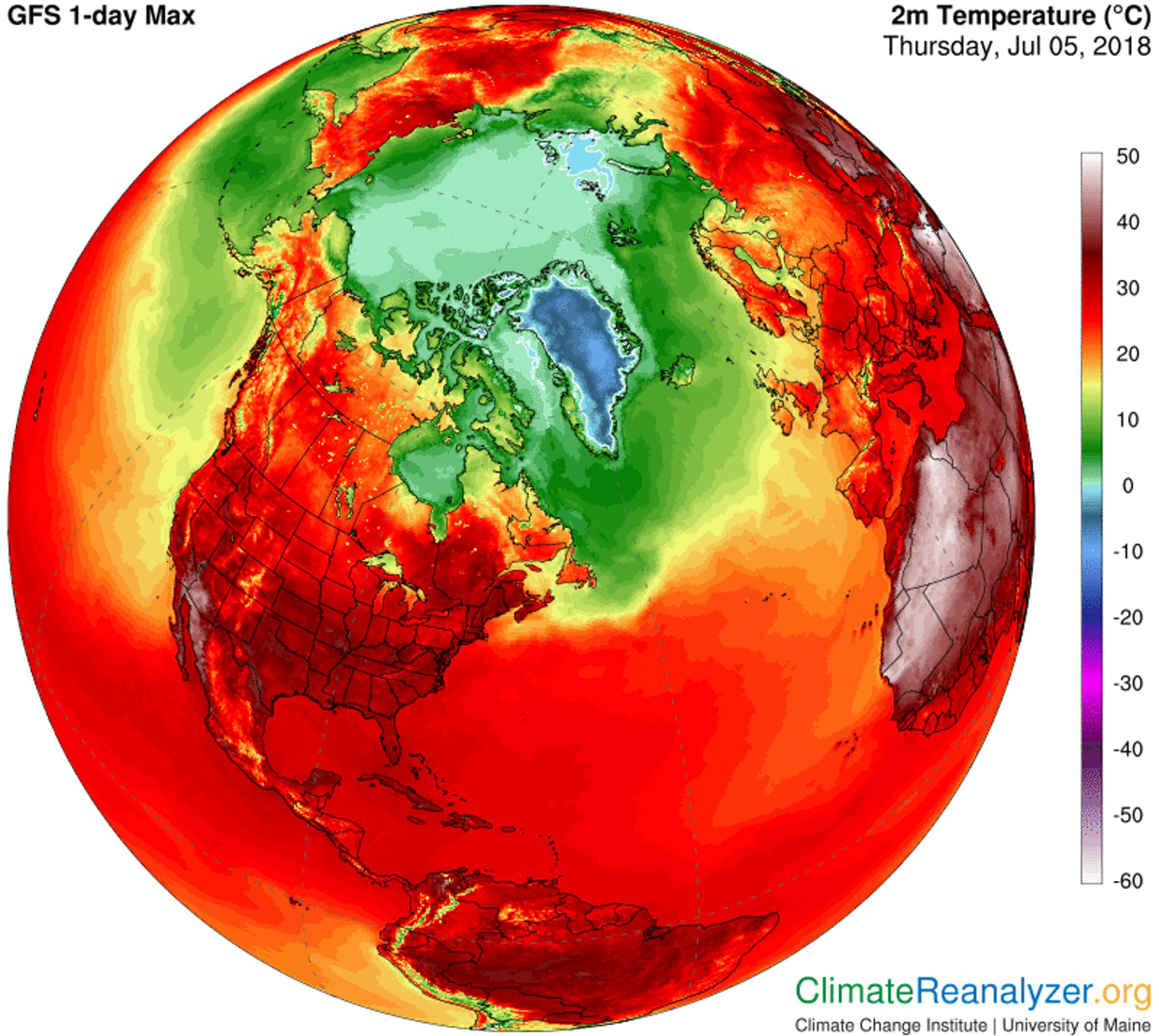- By Erik Shaw
Temperatures shatter all records as global heatwave continues
Advertisement – Advertise here from OMR 100 / $275 USD
Al-Sahawat Times | Ethical Global News from Oman and UAE | Donate HERE
Advertisement – Advertise here from OMR 100 / $275 USD
As the current global heatwave continues to break all records, cities across the Northern Hemisphere witnessed exceptionally high heat, with records breaking in North America, Europe, Middle East, and Western Asia.
Besides the long-term effects such temperatures may have on climate change, many of these weather milestones caused immediate hazards. And according to the most recent weather data from the University of Maine’s Climate Reanalyzer, the high temperatures show no sign of subsiding any time soon.
On Thursday, the temperature in parts of Russia’s icy Northern Siberia reached 33 C, according to the Washington Post. Northern Siberia sits along the coast of the Arctic Ocean, so it’s highly unusual for temperatures to spike above the minus 10 C average for the season.
Other typically cooler locations also suffered during the global heatwave, resulting in damaged buildings and infrastructure, and a spike in heat-related deaths.
The Climate Reanalyzer is a platform developed by the University of Maine and the National Science Foundation USA, to visualise climate and weather data sets. The brain child of Dr. Sean Birkel of the university’s School of Earth and Climate Sciences, the platform provides access to 10-day forecasts across the globe as well as maps that correlate to historical station data and deeper analysis.
The platform measured the air temperature at 2 meters above the ground level over the month of June 2018 across the entire globe and revealed some startling findings.

North America
Both the US and Canada reached milestones in record high temperatures in the first week of July. Denver tied its all-time record of 41 C while Burlington, Vermont, set its all-time warmest low-temperature of 27 C over a one week period (meaning the temperature, day or night, never dropped below 27 C for the entire week).
Meanwhile, Canada’s heatwave reached a dangerous new level in Quebec. On Monday 2 July 2018, Montreal saw its highest temperature in record history, reaching 38 C for the first time since records began in Canada, some 147 years ago.
On Thursday, CBC reported that the heat-related death toll jumped to 18 people in Montreal and at least 33 people across the province.
“Today is the highest-risk day for people who have not had access to cold places,” Dr. David Kaiser from Montreal’s public health department announced. “It’s not over yet.”

Europe
Europe’s Heat Wave has been extreme so far, to the point that the heat melted buildings.
Heat waves stretched across the continent but created the most problems in the usually chilly British Isles and Ireland.
On 28 June 2018, Shannon, Ireland reached a new all time historical while record of 32 C Belfast, Castleberg, and other cities in Northern Ireland also recorded similar record highs.
Scotland set its hottest temperature on record, reaching 33 C. This caused problems in Glasgow, which had been suffering its hottest day on record, clocking in at 32 C.
Glasgow wasn’t built to withstand such heat, and the record-breaking day caused the roof of the city’s science centre to melt, rubbery goo ran down the sides of the building as the roof softened and dripped.
London saw temperatures over 30 C for most of the month of June and the start of July with temperatures on the ‘Tube’ (the under ground rail network) reaching a dangerous joint record of 49 C matched only in 2017.
Asia, North-Africa and the Middle-East.
The heatwave across North-Africa, the Middle-East and West Asia didn’t just shatter regional records but set all time new global records.
Many regions within the Middle East are accustomed to high temperatures, but the 28 June 2018 created a new standard for what the Arab-Persian Gulf region could withstand.
The coastal city of Quriyat, Oman, never dropped below 43 C at night for the entire week, setting the highest minimum temperature ever recorded on Earth over a 24 hour period, and it broke this record every single day for a week. Day time temperatures broke thermometers which were incapable of recording over 60 C.
Later in the week, Russia and the Caucuses continued the trend of smashing temperature records. On the 2 July 2018, Yerevan, Armenia reached 43 C , a record high for the month of July. Two days later, Tbilisi, Georgia reached its all-time record of 41 C.
While scientists are still only scratching the surface of how this heatwave will affect certain cities in the long term, the immediate effects from the current heatwave were often just as precarious. Considering the Northern Hemisphere’s summer season only just kicked off in June, local governments will have to work with scientists to prepare for the extreme weather ahead as predictions are that the heatwave will last well into September in parts of the Midle-East and Mediterranean.
The really troubling data came from the Ocean temperatures, especially around the poles. The Antarctic, which is currently in the middle of its winter, saw temperatures high, even for its summer.
Oman
The Sultanate of Oman on the Gulf Cost not only overtook Iran and Libya to become the world’s hottest country officially with night time temperatures not dropping below 43 C and day time temperatures breaking 60 C. The GCC nation also saw the hottest sea temperature exasperating the ever growing dead zone in the Gulf of Oman where no fish or plant life can survive. (Read more…)

Since you’re here …
… we have a small favour to ask. More people are reading Al-Sahawat Times than ever but advertising revenues across the global media industry are falling fast. And unlike many news organisations, we haven’t put up a total paywall. We want to keep our journalism as open as we can. So you can see why we need to ask for your help. Al-Sahawat Times’ independent, investigative journalism takes a lot of time, money and hard work to produce. But we do it because we believe truly ethical media and an unbias perspective really matters.
“I appreciate there not being a paywall: it is more democratic for the media to be available for all and not a commodity to be purchased by a few. I’m happy to make a contribution so others with less means still have access to information.”
If everyone who reads our reporting, who likes it, helps fund it, the future of ethical media and the futures of our staff and their families would be much more secure. For as little as £1, you can support Al-Sahawat Times and it only takes a minute. Thank you.
This story is available on:
APPLE NEWS | GOOGLE NEWS | AL-SAHAWAT TIMES
Talk to a journalist
Email: NewsDesk@alsahawat.com
Web: alsahawat.com
Follow Al-Sahawat Times
E.Shaw@alsahawat.com | Journalist’s Profile
Views: 0






